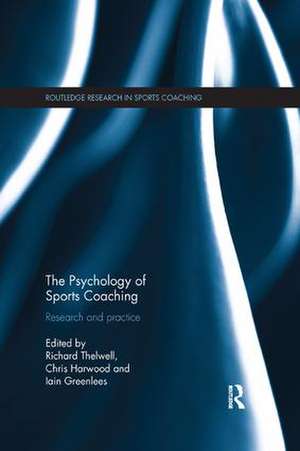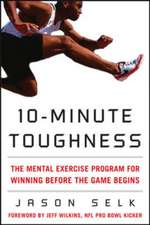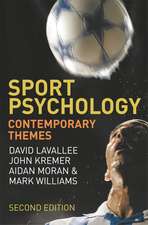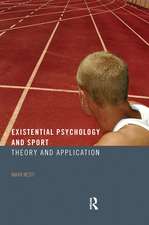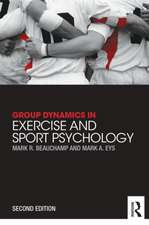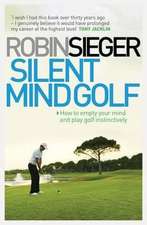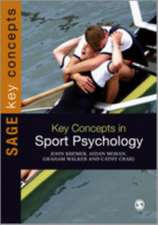The Psychology of Sports Coaching: Research and Practice: Routledge Research in Sports Coaching
Editat de Richard Thelwell, Chris Harwood, Iain Greenleesen Limba Engleză Paperback – 3 ian 2018
Written by an international team of researchers and practitioners at the cutting edge of psychology and coaching, each chapter introduces a key concept, defines key terms, provides a comprehensive literature review, and considers implications for future research and applied practice. Encompassing the latest developments in the field, it addresses topics such as:
- the theory behind effective coaching
- creating performance environments
- promoting psychological well-being
- developing resilience through coaching
- transformational leadership and the role of the coach.
| Toate formatele și edițiile | Preț | Express |
|---|---|---|
| Paperback (1) | 338.48 lei 6-8 săpt. | |
| Taylor & Francis – 3 ian 2018 | 338.48 lei 6-8 săpt. | |
| Hardback (1) | 822.22 lei 6-8 săpt. | |
| Taylor & Francis – 18 iul 2016 | 822.22 lei 6-8 săpt. |
Preț: 338.48 lei
Preț vechi: 386.85 lei
-13% Nou
Puncte Express: 508
Preț estimativ în valută:
64.78€ • 67.38$ • 53.48£
64.78€ • 67.38$ • 53.48£
Carte tipărită la comandă
Livrare economică 14-28 aprilie
Preluare comenzi: 021 569.72.76
Specificații
ISBN-13: 9780815357247
ISBN-10: 0815357249
Pagini: 304
Ilustrații: 12 Illustrations, black and white
Dimensiuni: 156 x 234 x 20 mm
Greutate: 0.46 kg
Ediția:1
Editura: Taylor & Francis
Colecția Routledge
Seria Routledge Research in Sports Coaching
Locul publicării:Oxford, United Kingdom
ISBN-10: 0815357249
Pagini: 304
Ilustrații: 12 Illustrations, black and white
Dimensiuni: 156 x 234 x 20 mm
Greutate: 0.46 kg
Ediția:1
Editura: Taylor & Francis
Colecția Routledge
Seria Routledge Research in Sports Coaching
Locul publicării:Oxford, United Kingdom
Public țintă
Postgraduate and UndergraduateCuprins
1. Coaching Athletes through Career Transitions
2. Creating Effective Development Environments for the Adolescent Athlete
3. The Theory (SDT) behind Effective Coaching
4. Understanding and Enhancing Coach-Athlete Relationships through the 3 +1C’s Model
5. Coaching through Organizational Change: The Influence of Leadership Succession Events
6. The Coach-Parent Interaction: Support or Distraction?
7. Helping Coaches Meet Their Psychological Needs
8. High Performance Coaching: Demands and Development
9. Coach Stress and Associated Impacts
10. Athlete Expectancies of Coaches and Their Consequences
11. Understanding Effective Coaching: Antecedents and Consequences
12. Definitions and Correlates of Coach Psychological Well- and Ill-Being
13. Transformational Leadership and the Role of the Coach
14. Enhancing Coaching Efficacy in the Psychosocial Development of Athletes
15. Antecedents and Impacts of Effective and Inspirational Coach Communication
16. Developing Resilience through Coaching
17. Integrating Decision-Making into Training
18. Pulling the Group Together: The Role of the Social Identity Approach
2. Creating Effective Development Environments for the Adolescent Athlete
3. The Theory (SDT) behind Effective Coaching
4. Understanding and Enhancing Coach-Athlete Relationships through the 3 +1C’s Model
5. Coaching through Organizational Change: The Influence of Leadership Succession Events
6. The Coach-Parent Interaction: Support or Distraction?
7. Helping Coaches Meet Their Psychological Needs
8. High Performance Coaching: Demands and Development
9. Coach Stress and Associated Impacts
10. Athlete Expectancies of Coaches and Their Consequences
11. Understanding Effective Coaching: Antecedents and Consequences
12. Definitions and Correlates of Coach Psychological Well- and Ill-Being
13. Transformational Leadership and the Role of the Coach
14. Enhancing Coaching Efficacy in the Psychosocial Development of Athletes
15. Antecedents and Impacts of Effective and Inspirational Coach Communication
16. Developing Resilience through Coaching
17. Integrating Decision-Making into Training
18. Pulling the Group Together: The Role of the Social Identity Approach
Notă biografică
Richard Thelwell is Head of Department for Sport and Exercise Sciences at the University of Portsmouth, UK. Richard has amassed a portfolio of over 70 peer-reviewed publications including edited book chapters, international journal publications and international conference papers. His current research interests lie within the area of coach psychology and in particular the themes of stress, emotion, coping and performance, psychological skills and behaviour change, and expectation effects. Richard also has a vested research interest in professional practice factors in applied sport psychology and is a Registered Psychologist of the Health and Care Professions Council. He also serves on the Editorial Board for the International Review of Sport and Exercise Psychology, the International Journal of Sport Psychology, and is Associate Editor for Case Studies in Sport and Exercise Psychology
Chris Harwood is a Reader in Applied Sport Psychology and Sport Psychology Research Group Leader at Loughborough University, UK. He is a Registered Psychologist of the Health and Care Professions Council, a Chartered Psychologist of the British Psychological Society and High Performance Sport Accredited (Psychology) Practitioner with the British Association of Sport and Exercise Sciences (BASES). His research and teaching interests lie mainly in the psychological aspects of youth sport and athlete development with a particular focus on the psychology of parenting and coaching. He is also interested in professional practice factors in applied sport psychology
Iain Greenlees is a Reader in Sport Psychology at the University of Chichester, UK. He is a Registered Psychologist of the Health and Care Professions Council and a Chartered Psychologist of the British Psychological Society. His research and teaching interests lie mainly in the psychological factors underpinning performance in sport and coaching settings. He is also interested in the efficacy of interventions in applied sport psychology. Iain is a former Associate Editor for The Sport and Exercise Psychology Review and he also now serves as an Editorial Board Member for The International Review of Sport and Exercise Psychology
Chris Harwood is a Reader in Applied Sport Psychology and Sport Psychology Research Group Leader at Loughborough University, UK. He is a Registered Psychologist of the Health and Care Professions Council, a Chartered Psychologist of the British Psychological Society and High Performance Sport Accredited (Psychology) Practitioner with the British Association of Sport and Exercise Sciences (BASES). His research and teaching interests lie mainly in the psychological aspects of youth sport and athlete development with a particular focus on the psychology of parenting and coaching. He is also interested in professional practice factors in applied sport psychology
Iain Greenlees is a Reader in Sport Psychology at the University of Chichester, UK. He is a Registered Psychologist of the Health and Care Professions Council and a Chartered Psychologist of the British Psychological Society. His research and teaching interests lie mainly in the psychological factors underpinning performance in sport and coaching settings. He is also interested in the efficacy of interventions in applied sport psychology. Iain is a former Associate Editor for The Sport and Exercise Psychology Review and he also now serves as an Editorial Board Member for The International Review of Sport and Exercise Psychology
Descriere
This is the first book to offer a comprehensive review of current research in the psychology of sports coaching. It provides detailed, critical appraisals of the conceptual underpinning of psychology in coaching and is organised around three main themes: factors affecting the coaching environment; enhancing coach performance, and working through coaches. Written by an international team of researchers and practitioners in psychology and coaching, each chapter introduces a key concept, defines key terms, provides a comprehensive literature review, and discusses implications for future research and applied practice. This is indispensable reading for all sport psychologists and coaches.
